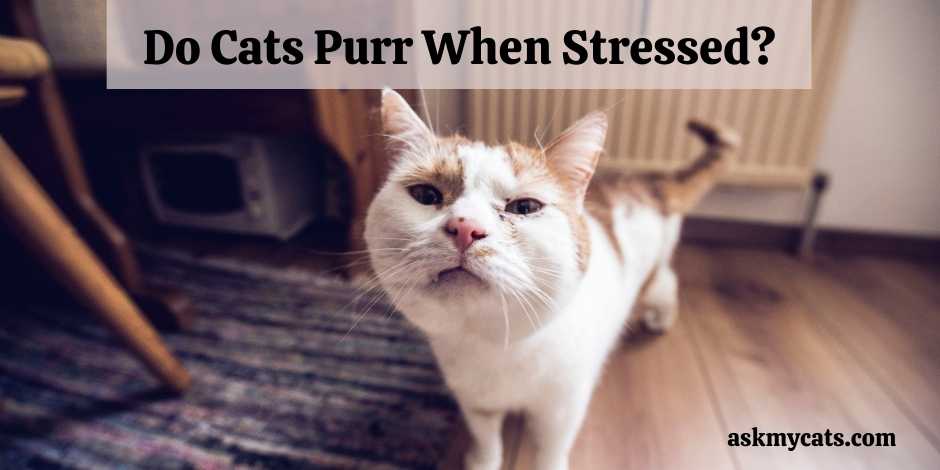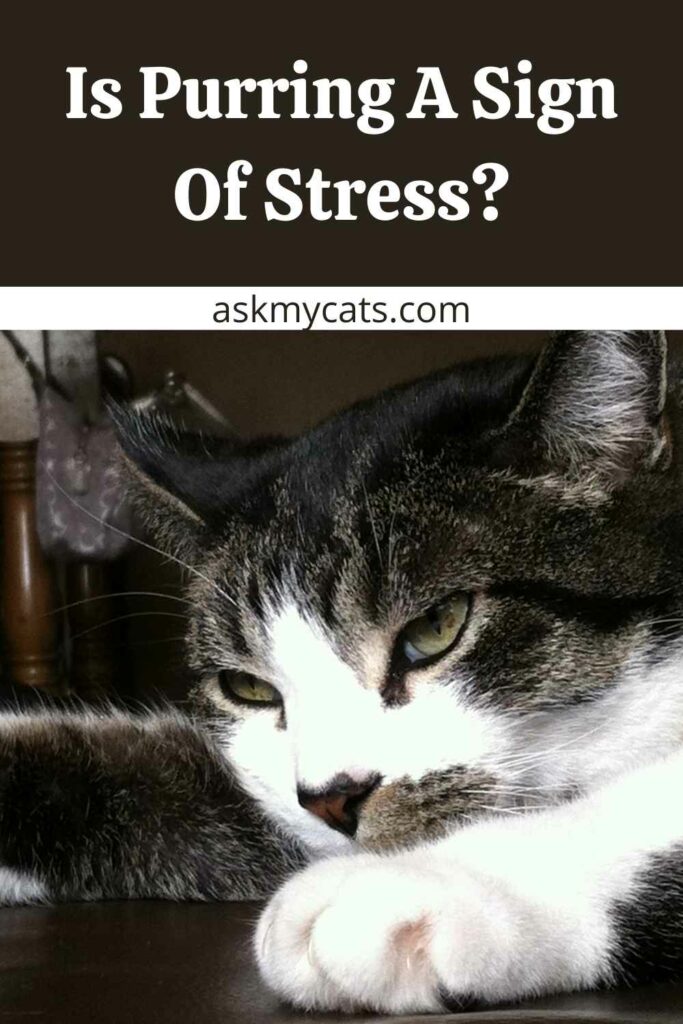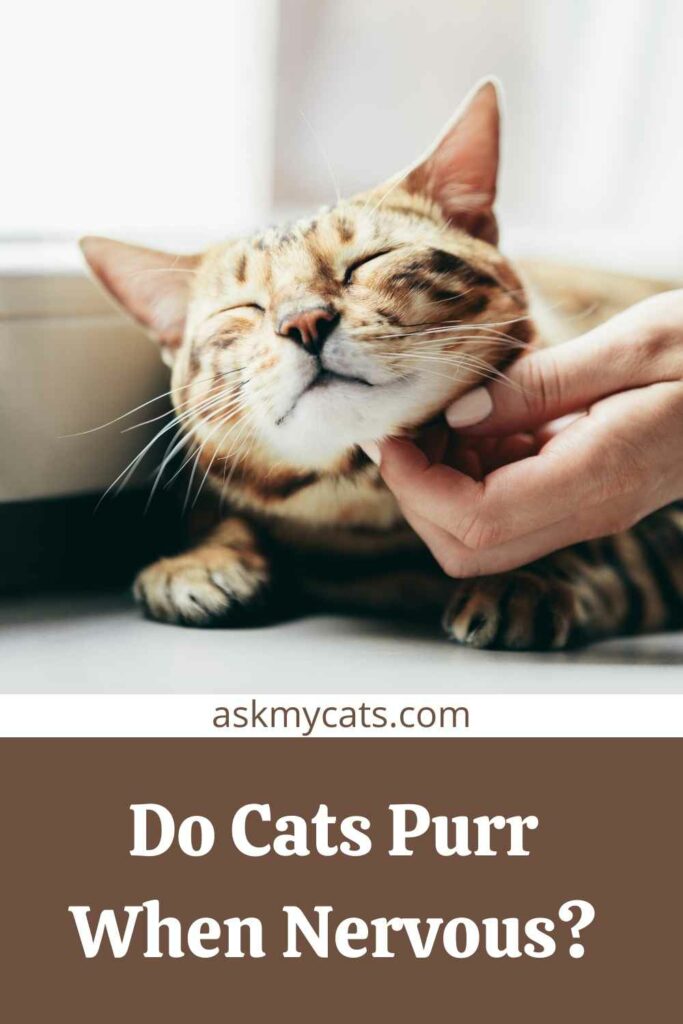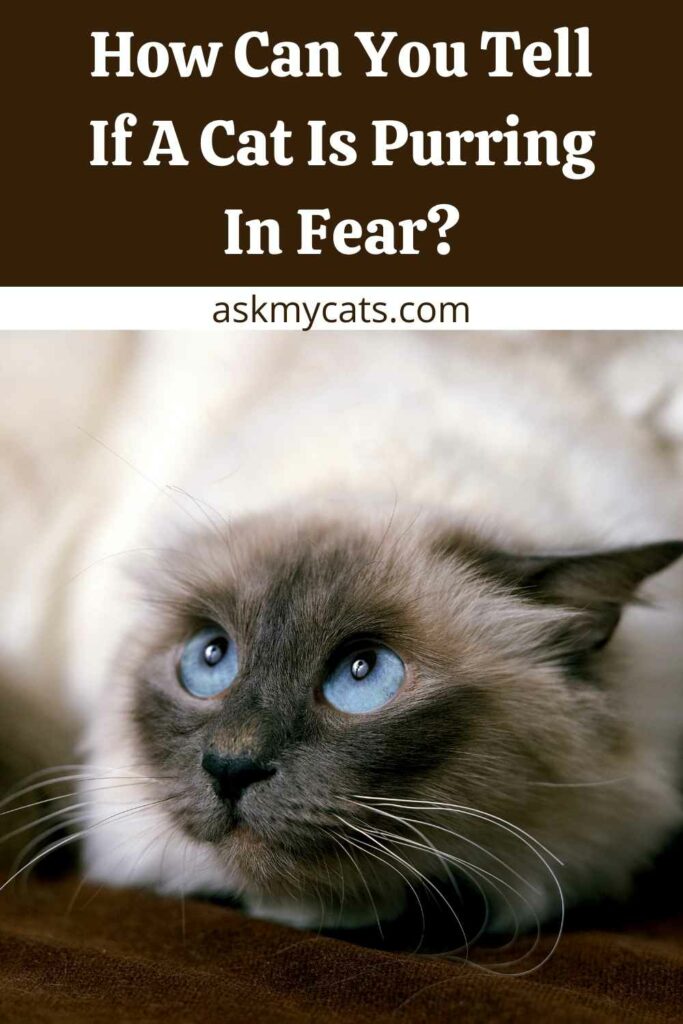Cats purr for a variety of reasons as they get older, including bonding and communication. They purr when they are happy, but they also purr when they are hungry, worried, afraid, unwell, or in pain.
Although purring is often associated with happiness in cats, it may also be used to express when they are worried, frightened, or seeking to communicate other requirements, such as pain or discomfort.
Cats purr to relax, according to scientists, and they’re just as likely to do it in a stressful or unpleasant scenario as they are when snuggled up in their owner’s lap. Purring produces low-frequency vibrations that help them relax and breathe more easily.
Keep reading to learn more about cat purring!
Key Takeaways
- Purring may be a sign of stress in cats.
- Purring can be a self-healing mechanism for cats.
- Cats may purr to stay calm in stressful situations.
- The frequency of a domestic cat’s purr is between 25 and 150 Hertz.
- Cats’ purring can be difficult to decipher, but it is important to pay attention to their vocalizations and body language.
- A cat purring in fear may have dilated pupils and a strange voice.


Give Your Cat the Perfect Day
Get the Free Ebook!
Is Purring A Sign Of Stress?
Yes, purring can be a sign of stress.

Cats purr not just when they’re joyful, but also when they’re worried or terrified, according to previous scientific studies.
Purring is also thought to be a defensive mechanism and a technique for cats to stay calm in stressful situations since the vibrations created can help cats relax.
However, further study is required to determine whether or not this idea is right.
To make themselves feel better, depressed cats may urinate in unsuitable areas. There are a variety of reasons why cats urinate outside the litter box, but stress, despair, and sorrow are among the most common.
Illnesses can make your cat feel unwell and even in pain. If it arches to move around, the cat may not be as lively as usual. Due to the sickness, the cat may feel queasy, refuse to eat, have a hormonal imbalance, or lack energy.
Fatty liver disease, FIV, FeLV, upper respiratory infections, diabetes, hypothyroidism, dental disease, and other major health issues can all have an impact on your cat’s enjoyment.
If you feel your cat is sad as a result of its illness, make an appointment with your veterinarian as soon as possible.
When cats breathe, the glottis, the region around their vocal cords, dilates and constricts rapidly and rhythmically. The purring sound is produced when air vibrates across the laryngeal muscles of the larynx.
Interesting Read: Do Cats Purr When They Are Sick Or In Pain?
Do Cats Purr When Nervous?
Yes, cats purr when they become nervous.

To begin with, not all purring implies happiness. Cats purr when they are scared or in pain, prompting some specialists to assume that this particular feline vocalization is a self-healing mechanism.
The frequency of a domestic cat’s purr is between 25 and 150 Hertz, which is also the frequency at which muscles and bones grow and heal themselves.
As a result, it’s thought that cats’ purr evolved through time as a survival tool — a biomechanical healing mechanism that ensured faster recovery times.
Cats, of course, purr even when they aren’t hurt. For example, many household cats purr to signify hunger.
The larynx (the entrance to the windpipe where the voice cords reside) and diaphragm are used to generate a feline purr.
The purr occurs while both breathing and exhaling and has a vibrational frequency of between 25 and 150 Hertz, according to scientificamerican.com.
This frequency is said to increase bone density and promote bone and muscle repair.
Cats don’t have the same level of facial expression as dogs, are typically quieter, and their actions might be more difficult to decipher—but that doesn’t make the feline mystique impenetrable.
Pay attention to your pet’s vocalizations, body postures, and daily activities to gain a deeper understanding of them.
You may grow so sensitive to your kitty’s personality and habits over time that you’re able to detect minor mood shifts and even spot health issues before they manifest physically.
Must Read: Cat Purring Effect On Humans: The Power of Cat Purring
How Can You Tell If A Cat Is Purring In Fear?
If your cat is purring with dilated pupils and a strange voice, then he is purring in fear.

Many things can make a cat nervous, like being chased by a dog or being compelled to visit the veterinarian. Unfortunately, a terrified cat is sometimes misidentified as violent.
This is because when a cat becomes increasingly afraid, she may believe that attacking is her only alternative.
It’s crucial to know how to spot a scared cat by recognizing body language, listening for vocalization, and responding to terrified shadows in order to protect your cat from attacking you out of fear.
When a cat is concerned, it purrs as a means of calming down, similar to how humans sing or hum to themselves when we are worried.
These signals may even be detected by humans, such as mutual happiness between a cat and its owner while caressing a cat in their lap.
Scientists may only conjecture about how a cat purrs, but most believe that the laryngeal muscles and the larynx respond to a neurological impulse, or oscillator, from the brain. There’s even a theory that purring causes endorphins to be released in cats.
The purr of a cat is unique in that it lasts throughout the whole breathing cycle. While breathing in and out, a cat continues to purr.
Unlike a “meow,” which sounds more like speaking, a purr appears to have its own rhythm until a cat decides to stop it.
A cat with a sick larynx will make a strange sound and may have difficulty swallowing and breathing correctly, leading to gagging. They may also develop nerve damage to the larynx, as well as a tumor or polyp that obstructs the airway.
In these situations, a veterinarian visit is required to perform an endoscopy of the affected region. To open the airways and enhance breathing, surgery may be required.
Interesting Read: Why Does My Cat Drool When He Purrs?
Why Do Cats Purr In Stressful Situations?
Cats purr in stressful situations because it helps to calm their mind.
Regardless matter why cats purr, it’s important to understand that the act of purring encompasses a wide spectrum of emotions in cats. This allows us to appreciate this unique form of expression as more than just a soothing sound that reduces our blood pressure.
Purring (and a variety of other low-frequency vocalizations in mammals) are frequently connected with pleasant social conditions, such as breastfeeding, grooming, resting, and being sociable.
Purring is more likely to be calming or self-soothing, as cats may purr in stressful conditions.
Interesting Read: Why Does My Cat Lay On Me And Purr?
Why Does My Cat Purr When She’s In Trouble?
Your cat purrs when she is in trouble because she wants to attract your attention.
Purring is more likely to be calming or self-soothing, as cats may purr in stressful conditions. Purring would thus be similar to how humans relieve stress by weeping, laughing, amusing themselves, or even rearranging their desks.
Although scholarly research on the issue is few, several veterinarians and cat aficionados have noticed cats sleeping next to one another and purring when one is hurt (a habit known as “purr therapy”).
Some of the Interesting reads regarding cat purring:
- Why Do Cats Purr? The Science of Cat Purring
- Why Doesn’t My Cat Purr?
- How To Make A Cat Purr?
- Why Do Cats Purr When They Are Dying?
- Do Cats Purr When They Sleep?
- Why Does My Cat Purr When He Sees Me?
- Why Is My Cat Purring So Much?
- Differences In Purring Between Cat Breeds
- Why Do Cats Purr When You Talk To Them?
- Why Does My Cat Purr So Loudly?
- Why Do Cats Purr When You Stroke Them?
- Can Cats Control Their Purring?
- Why Does My Cat’s Purring Sound Congested?
- Do Cats Purr When They Are Happy?
- Do Cats Breathe Faster When Purring?
- Why Do Cats Wag Their Tails While Purring?
- How To Purr Like A Cat?
- Why Do Cat’s Noses Get Wet When They Purr?
- Why Is My Pregnant Cat Purring So Much?
- Why Do Cats Purr And Knead?
- Do Feral Cats Purr?
Frequently Asked Questions
Does petting a cat reduce stress?
Petting your cat is a pleasurable experience. It can lower your blood pressure, aid in the release of a relaxing hormone, and reduce stress hormone levels.
How do cats react when they are scared?
When your cat is afraid, she may exhibit the following behaviors: Hiding. Aggression is a term that is used to describe (spitting, hissing, growling, piloerection [hair standing up], swatting, biting, scratching) Loss of bladder and/or bowel control.
Do cats sense anxiety?
Animals may be very perceptive to our feelings. According to studies, dogs will console their owners when they are upset, while cats can detect our emotional cues. Cats can sense when we’re upset or apprehensive, and as a result, they may become unhealthy.
Final Words
Your cat’s central nervous system does not regulate the impulses that instruct her to purr, which means she has the finest autopilot setting known to humans.
Although it may seem counterintuitive, some cats purr to soothe themselves when they are in pain or afraid. Purring is supposed to release chemicals known as endorphins, which have a calming effect.
Interesting Read: Why Does My Cat Purr While Playing?
Interesting Read: Do Older Cats Purr More or Less?
